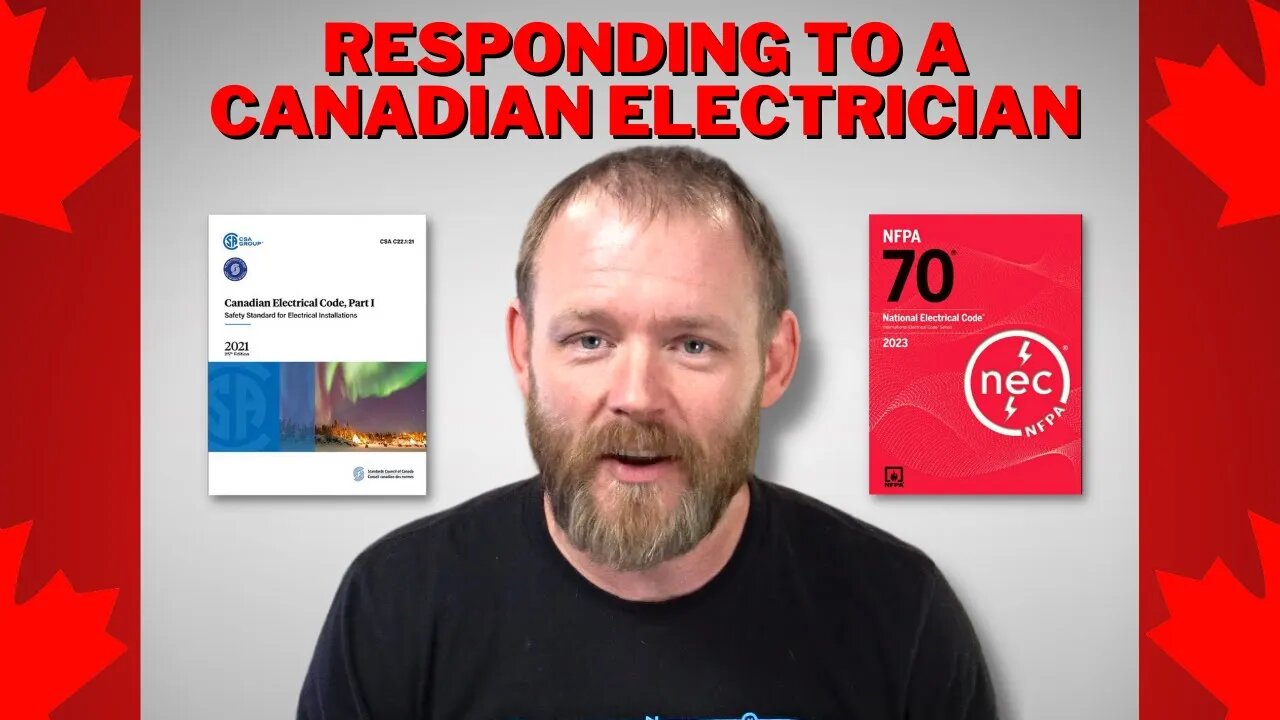Premium Only Content

I'm About to Graduate from High School and I Want to be an Electrician. What Should I Do?
Join this channel to get access to perks:
https://www.youtube.com/channel/UCB3jUEyCLRbCw7QED0vnXYg/join
As electricians, it goes without saying that we all got our start somewhere. I mean, we didn’t just roll out of the womb as awesome Sparky’s! In todays episode of Electrician U, Dustin answers a question from a follower in Canada about how to get into the trades right after high school.
🤘⚡️MEMBERSHIP⚡️🤘
JOIN ELECTRICIAN U - become a member and get:
FREE Continuing Education every year
FREE Practice Exams
FREE Monthly Video Courses
FREE Weekly Live Instructor-Led Classes
FREE Monthly Educational Newsletter
Premium Members-Only Content
Private Discord Channel
Monthly Members-Only Discord Chats
Sign up here --- https://www.electricianu.com/electrician-u-membership/
🎧🎹MUSIC AND VIDEO:🎹🎧
https://www.facebook.com/descantmv
🎬✍️ART AND ILLUSTRATION:✍️🎬
https://www.daverussoart.com
Before we get too far, there are a few things to keep in mind here. In the US, our electrical installations are to be installed with the most current version of the NEC (or National Electrical Code). In Canada, the Canadian Electrical Code is used (also known as the CE code or CSA C22.1). There are certainly differences between the 2 documents and what might be allowed in the US may not be allowed in Canada. Also, depending on where you are intent on working in Canada (or for certain electrical contractors), there may be requirements for apprenticeship and/or trade school. Having said all of that, the path to becoming an electrician can be quite similar regardless of whether you are working/living in the US or Canada.
As far as finding a contractor to work for, there are a couple of options. Union or Merit Shop, and there are benefits to both. With the Union (or IBEW), things are generally a bit more structured. Pay increases are given on a time basis, not necessarily on performance. Here in the US, there is also a 5-year apprenticeship if you choose to go union with schooling in the evenings after work. Union shops tend to work on the larger projects (government, hospitals, etc.) and there may even a wait list to get into the Union itself (some locals have a YEARS long wait list). Merit shops are the other option as far as electrical contractors go and cover the vast majority of the contractors out there. Merit shops are a bit more fluid, and promotions/raises are based upon the individual’s performance, not necessarily just time in grade. The overall type of work done by open (merit) shops covers the entire spectrum from residential to commercial to industrial. There may or may not be requirements for a formal apprenticeship, but that is generally based upon the contractor.
Trade schools are another way to get into the electrical trade. In lieu of going to work for a contractor and doing an apprenticeship (earn while you learn type), think of a trade school more akin to college. You will be in a classroom setting during the day to learn the ins and outs of the trade. The time frame needed for trade school can range from say 6 months to a couple of years depending on the courses you take. While an apprenticeship gives you the hands-on experience needed to perform as an electrician by working on the job, a trade school will provide you with the book knowledge and a limited amount of actual hands-on training both in a classroom setting (the hands-on portion limited by the schools/instructor’s budgets, curriculum, etc.). A bit of advice when it comes to trade schools- make sure the training you are receiving counts towards your overall time needed to receive your Journeyman’s license. Most employers (contractors) tend to hire based upon experience, not necessarily a certificate.
Regardless of where you desire to go to work within the trades, just make sure you do your research. Check the reviews for contractors and listen to word of mouth from other electricians, customers, etc. Also, check your local municipalities to see if there are any apprenticeship requirements as well as trade school requirements.
We hope this has been an insightful look into what starting out in the trades may look like for you. Is there a topic you would like to see discussed on Electrician U? Leave a comment in the comments section and let us know. Please continue to follow Dustin and Electrician U as we are constantly adding new content to assist our followers in becoming the best electricians that they can be.
-
 0:50
0:50
Electrician U
1 year agoWhat Are Lumens?
12.7K4 -
 1:52:24
1:52:24
Squaring The Circle, A Randall Carlson Podcast
1 day ago#032 Flournoy Holmes' Artwork Helped Define The Southern Rock Phenomenon of The Early 1970's
6.25K3 -
 19:56
19:56
inspirePlay
1 day ago $0.01 earnedWalking with Lions & Facing Africa’s Wild Side | Safari Adventure with the Grid Championship Crew!
2.57K -
 10:50
10:50
RTT: Guns & Gear
1 day ago $0.34 earnedBudget Friendly Carry 2011: EAA Girsan Brat 2311
5.4K1 -
 3:49:06
3:49:06
Alex Zedra
15 hours agoLIVE! New Game | Nuclear Nightmare
97.4K13 -
 25:08
25:08
MYLUNCHBREAK CHANNEL PAGE
1 day agoUnder The Necropolis - Pt 2
280K64 -
 1:45:59
1:45:59
Spittin' Chiclets
1 day agoCanadian Chokejob - Game Notes Live From Chicago - 12.28.2024
259K32 -
 9:18
9:18
Space Ice
1 day agoThe Guyver - Alien Bug Suits, Exploding Dragons, & Mark Hamill - Weirdest Movie Ever
164K26 -
 9:31
9:31
Silver Dragons
1 day agoSilver Has Failed - Can it Set the Record Next Year? THIS BANK SAYS YES!
3.23K2 -
 7:08
7:08
GBGunsRumble
18 hours agoGBGuns Range Report 28DEC24
1.75K